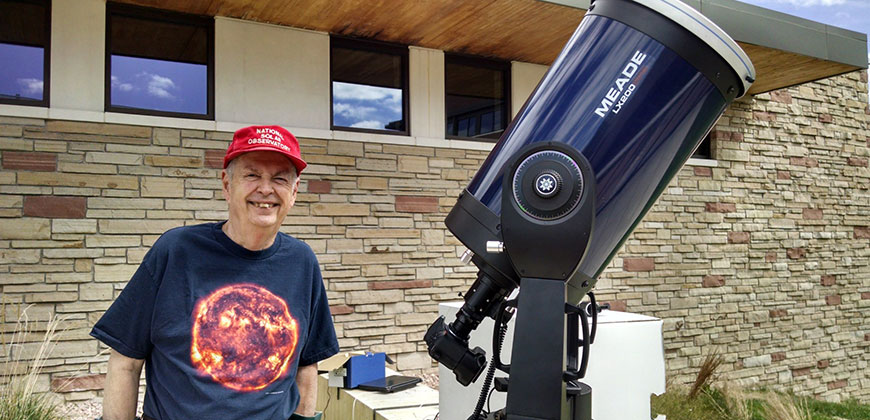
Professor of Physics Roger Culver has retired after 50 years teaching astronomy at CSU. He is pictured here at a May 9, 2016 transit of Mercury viewing party at the College of Natural Sciences Learning Community. An asteroid has been named in Culver’s honor.
Professor of Physics Roger Culver has retired after a half-century of astronomy teaching and research at Colorado State University. Along the way, he has inspired thousands of students, contributed to research in the field, and helped to create a new metric for light pollution.
On the occasion of his official retirement this summer, he was feted with a celebration and the naming of a little piece of our solar system in his honor: Asteroid 29874 Rogerculver.
Bright spot
Culver’s research over his long career has focused on variable stars, which change in brightness due to fluctuations in the star’s size or the star periodically being blocked by other objects, such as another star.
His more recent interests have expanded to all stars, or at least to those that we can see – or should be able to see – from here on Earth. He and colleagues have created a new way to measure this, which they have named the Light at Night Index (LANI). Because you can’t track a phenomenon very well if you can’t first measure it.
The reach of the project goes well beyond our sky view on the Front Range. In fact, the LANI provides thousands of cities and towns in the U.S. with a score on artificial light, in an effort to help municipalities and individuals think more carefully about the best use of lights at night.
One of Culver’s colleagues on the LANI project is his long-time friend and collaborator Eric Craine, an affiliate faculty member at CSU. The two have known each other since graduate school and have worked together on numerous projects over the decades.
“Roger is enormously refreshing,” Crane says, and “absolutely reliable, which makes for a very enjoyable colleague. CSU is going to be a very different place in his absence.”
Craine and Culver are co-directors of the Global Network of Astronomical Telescopes, a nonprofit astronomical research foundation. Fellow director Roy Tucker discovered asteroid 29874, entitling Tucker to name it. “Asteroid naming is a privilege of the discoverer,” Craine notes. “Such naming is not trivial and should be viewed as a real honor.” (Culver joins the likes of the late musician Freddie Mercury, all six members of Monty Python, and numerous other celebrities in having an asteroid named in his honor.)
Positive insights
When Culver first arrived to teach astronomy at CSU, he was still a student himself, finishing up his Ph.D. in astrophysics from the Ohio State University. Since then, he has become a well-known figure for generations of students.
“One of the most remarkable things about Roger Culver’s record as an astronomy professor is the reaction of former students when I happen to mention his class,” said Jacob Roberts, chair of the physics department. “Almost uniformly, they comment on how much they enjoyed the class and really felt they learned about astronomy. His legacy is in part formed by the tens of thousands of students he has taught over his career at CSU – and how many of them have gained positive insights about astronomy from him.”
In addition to his formal retirement party last month, Culver’s work and teaching were celebrated with an astronomy party at the College of Natural Sciences Learning Community in May. On view: the transit of Mercury. On the menu: liquid nitrogen ice cream.
New orbits
Culver might have stepped out of the classroom, but he will still be on campus from time to time. He maintains a photometer, on the roof of the Natural and Environmental Sciences Building, to measure sky brightness. He uses the photometer to track changes in Fort Collins’ LANI score.
And if you ever are curious about the whereabouts of his namesake asteroid, it is trackable through NASA’s Jet Propulsion Laboratory near Earth objects database.
Although the physics department is losing one of its stars, the field’s future at CSU remains bright, with the arrival of Emily Hardegree-Ullman, from University of Illinois, as the new astronomy instructor.